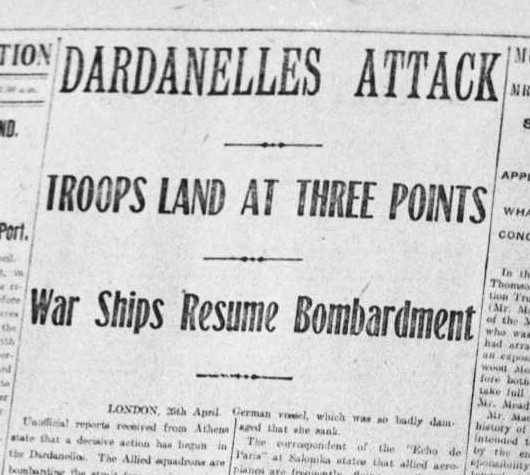-

 Dardanelles — the narrow strait between mainland Turkey in Asia and the peninsula of Gallipoli in Europe. The British and French considered it of strategic importance in securing a southern "warm" sea-route to resupply Russia. The first Allied landings in what became the Gallipoli Campaign had occurred on 25 April 1915 (that is, ten days before) at Cape Helles and Anzac Cove.
Dardanelles — the narrow strait between mainland Turkey in Asia and the peninsula of Gallipoli in Europe. The British and French considered it of strategic importance in securing a southern "warm" sea-route to resupply Russia. The first Allied landings in what became the Gallipoli Campaign had occurred on 25 April 1915 (that is, ten days before) at Cape Helles and Anzac Cove.
-

Charles Dixon, 1922. An impression of the landings at "V" Beach Gallipoli from the beached steamer River Clyde, portraying the 1st RDF, Munster Fusiliers and Hampshire Regiment under fire from the cliffs above.
no word of the Dubs — 1st battalion Royal Dublin Fusiliers were the first ashore at "V" Beach, Cape Helles. In the initial fifteen minutes of landing, the battalion lost 21 officers and 560 men. ((Dublin-Fusiliers.com))
-

John George Mulvany, "Cottage Interior", c.1828 – flitches of bacon hanging from the rafters
bacon and cabbage — traditional Irish dish. The playwright John B. Keane wrote temptingly of Irish bacon: "Lest the wrong impression be given, let me say at once that the type of bacon I have in mind is homecured. It has been hanging from the ceiling for months, and when you cut a chunk from it there is the faintest of golden tinges about its attractive shapeliness. When this type of bacon is boiling with its old colleague, white cabbage, there is a gurgle from the pot that would tear the heart out of a hungry man." – John B. Keane, Strong Tea, 1963.
- Fight for Ypres — Second Battle of Ypres (April 22 – May 25, 1915) in Belgium on the Western Front.
- Stupefying Gases — 2nd Ypres marked the first extensive use of chlorine gas on the Western Front.
- no mention of the Dubs — 2nd battalion RDF suffered heavy losses at Ypres. On 24 May a German gas attack effectively disintegrated the battalion as a fighting unit. (("Of 666 men, only one officer and 20 other ranks 'retired' to headquarters" – RDF Association.))
- beyond the beyonds — (("beyond belief, excessive" – Slanguage.))
- gas and gaskets — exaggerated nonsense. ((gas: "empty talk; baseless boasting or threats" – Partridge HS.)) ? gaskets: an echoic amplification. cf. ((gas and gaiters: "exaggerated rubbish" – Partridge.))
- Rosary — a Catholic devotion told over beads. Rosary
- grace — short prayer before, or after, a meal. ((OED.))
- Holy Mary ... — from the "Hail Mary" prayer recited in the Rosary.
- juldy — haste. A rendering of ((jildi: "haste, as in phrases 'on the jildi', in a hurry, and 'to do or move a jildi'" military slang, originally Anglo-Indian – OED.)) ((jildi!: "look sharp!" – Partridge HS.))
- chop-chop — (("quickly" pidgin – Farmer 1904.))
- keen as mustard — extremely eager or enthusiastic. ((Oxford Idioms.))
- hanging dogs — downcast. formed on ((hangdog: "downcast, furtive, or guilty in appearance or manner" – Collins.))
- catch on to himself — ? come to an understanding of what he is about. ((catch on: "to understand; to grasp in meaning" colloquial – Farmer 1904.)) ((catch oneself on: "come to a realisation of something, adopt a normal view" – Slanguage.))
- shop-miss — ? shop assistant.
- crumbi rumpitita — misrendering of Latin crambe repetita (("warmed-over cabbage, i.e., the same old thing" – Routledge Latin Quotations.)) From Juvenal, Satires vii; 154.
- drumming up trade — canvassing for customers. ((drum: "to obtain (custom, customers) by canvassing or solicitation" – OED.))
-

River Shannon
Shannon — the River Shannon, longest in Ireland; and (hee-hee) longer than any in Britain.
- fair dues — fair enough. (("indication of agreement, admiration" – Slanguage.))
- scholarship boy — Jim attends Presentation College on a scholarship, i.e. with reduced fees.
- hold your horses — be patient. ((OED.))
- do your buttons up first — ? don't be rash. ((have a button loose: "be silly, crazy, slightly mad" military – Partridge.)) ((not to have all one's buttons: "to be deficient in intellect" – Farmer 1904.))
- horse-sense — common sense. (("esp. if unrefined and somewhat earthy" U.S.; anglicized ca. 1895 – Partridge HS.))
- Quality Street — where live "the quality" (("people of good social position" – OED)). cf Quality Street, play by JM Barrie, first performed 1901.
- hare — (("to run or move with great speed" – OED.))
-
Da ... Papa — "Da" is the usual familiar appellation in Ireland (cf Da, play by Hugh Leonard, 1978). "Papa" (("from French, introduced 17th century as papà" – OED)) was considered more "genteel", "refined". (("since ca. 1880, obsolescent except when jocular" – Partridge HS.))
-

Lemon's Sweets logo adoped in the 1920s
Lemon's sweets — a popular brand of sweets (("enjoyed by Irish people since 1842" – Lemon's.)) (("a pyramid of jars filled with aromatic
boiled sweets from Lemon's of Suckville Street" – O'Casey 3.)) ((Joyce, Ulysses, 1922 describes the outlet in O'Connell Street Dublin: "Pineapple rock, lemon platt, butter scotch. A sugarsticky girl shovelling scoopfuls of creams for a christian brother. Some school treat. Bad for their tummies. Lozenge and comfit manufacturer to His Majesty the King."))
- out of tongueshot — out of calling range. ((tongue-shot: "speaking or talking distance, voice-range" – OED.))
- gamesome — sportive. ((OED.))
- hangs up his fiddle when he's home — (("said of persons who are entertaining abroad but not in their family circle" – OED.))
- hobbledehoy — (("a youth at the age between boyhood and manhood; esp. a clumsy or awkward youth" – OED.)) (("as in the folk-rhyme 'hobbledehoy, neither man nor boy'" – Farmer 1904.))
- going off — going on. ((colloquial – Partridge HS.))
- bombazine — (("twilled fabric ... formerly worn dyed black for mourning" – Collins.))
- herrings above — minced oath, "heavens above!" ((by herrings: "by heavens" – PWJ 1910.))
- dungcart — properly (("a cart used to convey manure" – OED.)) But here used as the cart for conveying sewage from houses unattached to a sewer system.

 Dardanelles — the narrow strait between mainland Turkey in Asia and the peninsula of Gallipoli in Europe. The British and French considered it of strategic importance in securing a southern "warm" sea-route to resupply Russia. The first Allied landings in what became the Gallipoli Campaign had occurred on 25 April 1915 (that is, ten days before) at Cape Helles and Anzac Cove.
Dardanelles — the narrow strait between mainland Turkey in Asia and the peninsula of Gallipoli in Europe. The British and French considered it of strategic importance in securing a southern "warm" sea-route to resupply Russia. The first Allied landings in what became the Gallipoli Campaign had occurred on 25 April 1915 (that is, ten days before) at Cape Helles and Anzac Cove. no word of the Dubs — 1st battalion Royal Dublin Fusiliers were the first ashore at "V" Beach, Cape Helles. In the initial fifteen minutes of landing, the battalion lost 21 officers and 560 men. ((Dublin-Fusiliers.com))
no word of the Dubs — 1st battalion Royal Dublin Fusiliers were the first ashore at "V" Beach, Cape Helles. In the initial fifteen minutes of landing, the battalion lost 21 officers and 560 men. ((Dublin-Fusiliers.com)) bacon and cabbage — traditional Irish dish. The playwright John B. Keane wrote temptingly of Irish bacon: "Lest the wrong impression be given, let me say at once that the type of bacon I have in mind is homecured. It has been hanging from the ceiling for months, and when you cut a chunk from it there is the faintest of golden tinges about its attractive shapeliness. When this type of bacon is boiling with its old colleague, white cabbage, there is a gurgle from the pot that would tear the heart out of a hungry man." – John B. Keane, Strong Tea, 1963.
bacon and cabbage — traditional Irish dish. The playwright John B. Keane wrote temptingly of Irish bacon: "Lest the wrong impression be given, let me say at once that the type of bacon I have in mind is homecured. It has been hanging from the ceiling for months, and when you cut a chunk from it there is the faintest of golden tinges about its attractive shapeliness. When this type of bacon is boiling with its old colleague, white cabbage, there is a gurgle from the pot that would tear the heart out of a hungry man." – John B. Keane, Strong Tea, 1963. Shannon — the River Shannon, longest in Ireland; and (hee-hee) longer than any in Britain.
Shannon — the River Shannon, longest in Ireland; and (hee-hee) longer than any in Britain. Lemon's sweets — a popular brand of sweets (("enjoyed by Irish people since 1842" – Lemon's.)) (("a pyramid of jars filled with aromatic
boiled sweets from Lemon's of Suckville Street" – O'Casey 3.)) ((Joyce, Ulysses, 1922 describes the outlet in O'Connell Street Dublin: "Pineapple rock, lemon platt, butter scotch. A sugarsticky girl shovelling scoopfuls of creams for a christian brother. Some school treat. Bad for their tummies. Lozenge and comfit manufacturer to His Majesty the King."))
Lemon's sweets — a popular brand of sweets (("enjoyed by Irish people since 1842" – Lemon's.)) (("a pyramid of jars filled with aromatic
boiled sweets from Lemon's of Suckville Street" – O'Casey 3.)) ((Joyce, Ulysses, 1922 describes the outlet in O'Connell Street Dublin: "Pineapple rock, lemon platt, butter scotch. A sugarsticky girl shovelling scoopfuls of creams for a christian brother. Some school treat. Bad for their tummies. Lozenge and comfit manufacturer to His Majesty the King."))